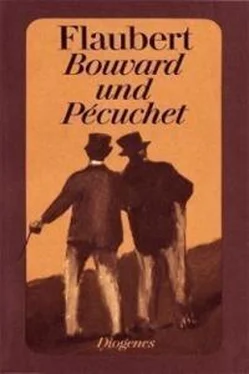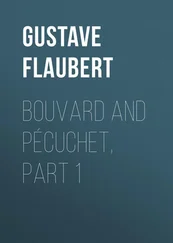But with skill the muffler could be slipped off!
These denials by the physician roused Pécuchet's indignation. He even ventured to pretend that La Barbée could describe what was actually taking place in his own house.
"May be so," returned the doctor.
Then, taking out his watch:
"What is my wife occupying herself with?"
For a long time La Barbée hesitated; then with a sullen air:
"Hey! what? I am there! She is sewing ribbons on a straw hat."
Vaucorbeil snatched a leaf from his note–book and wrote a few lines on it, which Marescot's clerk hastened to deliver.
The séance was over. The patients went away.
Bouvard and Pécuchet, on the whole, had not succeeded. Was this due to the temperature, or to the smell of tobacco, or to the Abbé Jeufroy's umbrella, which had a lining of copper, a metal unfavourable to the emission of the fluid?
Vaucorbeil shrugged his shoulders. However, he could not deny the honesty of MM. Deleuze, Bertrand, Morin, Jules Cloquet. Now these masters lay down that somnambulists have predicted events, and submitted without pain to cruel operations.
The abbé related stories more astonishing. A missionary had seen Brahmins rushing, heads down, through a street; the Grand Lama of Thibet rips open his bowels in order to deliver oracles.
"Are you joking?" said the physician.
"By no means."
"Come, now, what tomfoolery that is!"
And the question being dropped, each of them furnished an anecdote.
"As for me," said the grocer, "I had a dog who was always sick when the month began on a Friday."
"We were fourteen children," observed the justice of the peace. "I was born on the 14th, my marriage took place on the 14th, and my saint's–day falls on the 14th. Explain this to me."
Beljambe had often reckoned in a dream the number of travellers he would have next day at his inn; and Petit told about the supper of Cazotte.
The curé then made this reflection:
"Why do we not see into it quite easily?"
"The demons—is that what you say?" asked Vaucorbeil.
Instead of again opening his lips, the abbé nodded his head.
Marescot spoke of the Pythia of Delphi.
"Beyond all question, miasmas."
"Oh! miasmas now!"
"As for me, I admit the existence of a fluid," remarked Bouvard.
"Nervoso–siderial," added Pécuchet.
"But prove it, show it, this fluid of yours! Besides, fluids are out of fashion. Listen to me."
Vaucorbeil moved further up to get into the shade. The others followed him.
"If you say to a child, 'I am a wolf; I am going to eat you,' he imagines that you are a wolf, and he is frightened. Therefore, this is a vision conjured up by words. In the same way the somnambulist accepts any fancies that you desire him to accept. He recollects instead of imagining, and has merely sensations when he believes that he is thinking. In this manner it is possible for crimes to be suggested, and virtuous people may see themselves ferocious beasts, and involuntarily become cannibals."
Glances were cast towards Bouvard and Pécuchet. Their scientific pursuits were fraught with dangers to society.
Marescot's clerk reappeared in the garden flourishing a letter from Madame Vaucorbeil.
The doctor tore it open, turned pale, and finally read these words:
" I am sewing ribbons on a straw hat. "
Amazement prevented them from bursting into a laugh.
"A mere coincidence, deuce take it! It proves nothing."
And as the two magnetisers wore looks of triumph, he turned round at the door to say to them:
"Don't go further. These are risky amusements."
The curé, while leading away his beadle, reproved them sternly:
"Are you mad? Without my permission! Practices forbidden by the Church!"
They had all just taken their leave; Bouvard and Pécuchet were talking to the schoolmaster on the hillock, when Marcel rushed from the orchard, the bandage of his chin undone, and stuttered:
"Cured! cured! good gentlemen."
"All right! enough! Let us alone."
Petit, a man of advanced ideas, thought the doctor's explanation commonplace and unenlightened. Science is a monopoly in the hands of the rich. She excludes the people. To the old–fashioned analysis of the Middle Ages it is time that a large and ready–witted synthesis should succeed. Truth should be arrived at through the heart. And, declaring himself a spiritualist, he pointed out several works, no doubt imperfect, but the heralds of a new dawn.
They sent for them.
Spiritualism lays down as a dogma the fated amelioration of our species. Earth will one day become Heaven. And this is the reason why the doctrine fascinated the schoolmaster. Without being Catholic, it was known to St. Augustine and St. Louis. Allan Kardec even has published some fragments dictated by them which are in accordance with contemporary opinions. It is practical as well as benevolent, and reveals to us, like the telescope, the supernal worlds.
Spirits, after death and in a state of ecstasy, are transported thither. But sometimes they descend upon our globe, where they make furniture creak, mingle in our amusements, taste the beauties of Nature, and the pleasures of the arts.
Nevertheless, there are amongst us many who possess an astral trunk—that is to say, behind the ear a long tube which ascends from the hair to the planets, and permits us to converse with the spirits of Saturn. Intangible things are not less real, and from the earth to the stars, from the stars to the earth, a see–saw motion takes place, a transmission, a continual change of place.
Then Pécuchet's heart swelled with extravagant aspirations, and when night had come Bouvard surprised him at the window contemplating those luminous spaces which are peopled with spirits.
Swedenborg made rapid journeys to them. For in less than a year he explored Venus, Mars, Saturn, and, twenty–three times, Jupiter. Moreover, he saw Jesus Christ in London; he saw St. Paul; he saw St. John; he saw Moses; and in 1736 he saw the Last Judgment.
He has also given us descriptions of Heaven.
Flowers, palaces, market–places, and churches are found there, just as with us. The angels, who were formerly human beings, lay their thoughts upon leaves, chat about domestic affairs or else on spiritual matters; and the ecclesiastical posts are assigned to those who, in their earthly career, cultivated the Holy Scripture.
As for Hell, it is filled with a nauseous smell, with hovels, heaps of filth, quagmires, and ill–clad persons.
And Pécuchet racked his brain in order to comprehend what was beautiful in these revelations. To Bouvard they seemed the delirium of an imbecile. All such matters transcend the bounds of Nature. Who, however, can know anything about them? And they surrendered themselves to the following reflections:
Jugglers can cause illusions amongst a crowd; a man with violent passions can excite other people by them; but how can the will alone act upon inert matter? A Bavarian, it is said, was able to ripen grapes; M. Gervais revived a heliotrope; one with greater power scattered the clouds at Toulouse.
It is necessary to admit an intermediary substance between the universe and ourselves? The od, a new imponderable, a sort of electricity, is perhaps nothing else. Its emissions explain the light that those who have been magnetised believe they see: the wandering flames in cemeteries, the forms of phantoms.
These images would not, therefore, be illusions, and the extraordinary gifts of persons who are possessed, like those of clairvoyants, would have a physical cause.
Whatever be their origin, there is an essence, a secret and universal agent. If we could take possession of it, there would be no need of force, of duration. That which requires ages would develop in a minute; every miracle would be practicable, and the universe would be at our disposal.
Читать дальше








![Гюстав Флобер - Закат Карфагена [Сборник]](/books/414440/gyustav-flober-zakat-karfagena-sbornik-thumb.webp)


